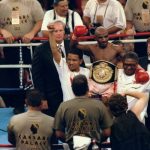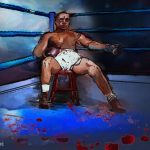Eddie Musi, the legendary papa of Kenyan boxing
Kenya’s best boxing days were spearheaded by a South African who left the country to join the armed struggle but ended up finding a home in Nairobi, where he coached the pugilist’s sport.
Author:
14 December 2019

The finest chapter in the history of Kenya’s boxing has South African fingerprints all over its pages. That chapter began in the 1970s and ended in the early 1980s. The Hit Squad, as the national team was known by its legions of fans, were East and Central African, All-Africa and Commonwealth Games champions.
Its first torchbearer, Philip Waruinge, was voted the best boxer of the 1972 Olympic Games and his successor, Stephen Muchoki, became world amateur boxing champion in 1978.
These two boxers had a native of Orlando, Johannesburg, named Eddie Musi, to thank for their success, not only because he coached them but because he made them fight for their lives with his charges breathing down their necks. And they were many. The ranks of the three national teams Kenya could put up at any one time was filled with them. There was always Musi’s boy, either in the team or on the doorstep, waiting to get in.
“Papa” was the name by which Musi was universally known in Kenya. “Niaje, Papa?” (How are you, Papa?) children from the teeming slums of Kariobangi in the north of Nairobi, where he established his boxing club in 1967, would call out when they saw him. He was the father who happened upon them from the south and became as Kenyan as their own ancestors.
His production of one national champion after another brought him to the notice of the media and the technical personnel who selected the Hit Squad. I hurried to Kariobangi to talk to him and found a passionate man. Musi was consumed by boxing and spoke about it with gusto. He was passionate when speaking about his roots, which he had now severed.
Related article:
“When armed struggle against apartheid became inevitable in the 1950s,” he said, “we young men were sent to various countries for military training. I was sent to Egypt. After training, we were taken to Tanzania and eagerly awaited our orders to return home and fight the minority regime.
“But our orders never came. We waited and waited and our cadres started gradually assimilating themselves in ordinary Tanzanian life. When I lost hope that I would return home to fight, I came to Kenya to look for my fortune. I have never returned home.”
Pushed to the struggle
Tanzania, the leader of the African frontline states then arrayed against apartheid South Africa, hosted military bases for fighters of Umkhonto weSizwe, the armed wing of the ANC.
The event that gave impetus to his departure from home was the 1960 Sharpeville massacre in which apartheid police officers shot and killed 69 people and wounded 180 others. It was the cataclysmic event that finally convinced anti-apartheid leaders that armed struggle was necessary. Musi was one of the young people recruited to fuel the armed campaign. He left South Africa in 1962.
Related article:
Many years later, as a greying coach slowed by the passage of years, he reflected on his life and told a sports journalist: “I left home with only a pair of jeans, believing that I would be away for just a year or so after receiving guerrilla training. I left behind my wife and two young daughters. I would never see them again. I recently learnt that my wife and one of the girls had died while the remaining one had got married.”
Apartheid finally collapsed with the release of Nelson Mandela in 1990 and the first multiracial elections in 1994. Many South African refugees returned home but Musi chose to stay in Kenya. He explained: “How many people will remember me back home now? If I return, what work shall I do? Milking cows, maybe? No. Everybody here knows me. I’m better off here. I can’t start all over again. This my home.”
And what a home he had made, not in the shape of an opulent mansion but in the human bonds he forged. Once established in Nairobi, he did what he used to do in Orlando: box. But this time, coaching, not fighting. The Kariobangi slum is as tough a neighbourhood as they come. Musi seamlessly assimilated with the locals and in the course of time, became the legendary papa of Kenya boxing.
Musi was chief trainer of the national team that won the 1978 and 1982 Commonwealth Games titles. Not just popular among his charges but beloved as well, he was a shoe-in for head coach. But the politics of the sport couldn’t allow it. A native Kenyan had to lead the team, even though boxers clearly paid more attention to Musi than his boss.
It wasn’t just because of his charisma, his freewheeling and unorthodox tactics worked. He also wanted his fighters to have fun. In the run-up to the 1982 Olympics, Waruinge, who would win the Val Barker Trophy as the best boxer of the Olympics despite his semifinal loss – it was widely held that he was a victim of racial discrimination – came up against Musi’s boy, a dazzling youngster named George Oduori.
He got the fright of his life. He was taken the full distance and only his experience saved him. And yet this was a man at the top of his game, the 1968 Olympic silver medallist and reigning All-Africa Games champion. It was this particular bout that introduced Musi as a tactician to the Kenyans.
A place called home
As a young sports reporter, I covered the 1982 Commonwealth Games in Brisbane, Australia. Musi’s boxers won five medals – three gold, one silver and one bronze. His passion about the boys he trained remained as intense as ever. His concern for their progress was that of a responsible father for his children.
He was one of the first people to make me think that home is more a place in the mind than a physical residence. Musi was perfectly at home in Kenya. To him, people were just people. He never got to go back to his birthplace to fight but he gave many youngsters a chance in life. Most of those from his gym who excelled ended up with jobs at the numerous companies that were keen to promote their brand using successful sports stars. Without the opportunity that he created for them, it is doubtful they would have made their way out of that tough neighbourhood.
Related article:
In the final years of his life, Musi was stricken by one ailment or another. A steady stream of his extended boxing fraternity visited him at his modest house. Now that he could no longer coach, he tried to regale them with memories of long ago, when Kenyans were kings of the amateur boxing arena, challenging the heavyweights – the then Soviet Union, the United States and Cuba.
But memory was also failing him. Still, the presence of so many people seeing him everyday and trying to make his days of infirmity comfortable attested to a kinship born of many decades of faithful friendship. He was truly among family.
Eddie Musi died on 8 September 2011 and was buried in the Lang’ata public cemetery in Nairobi. He was 74 years old.



